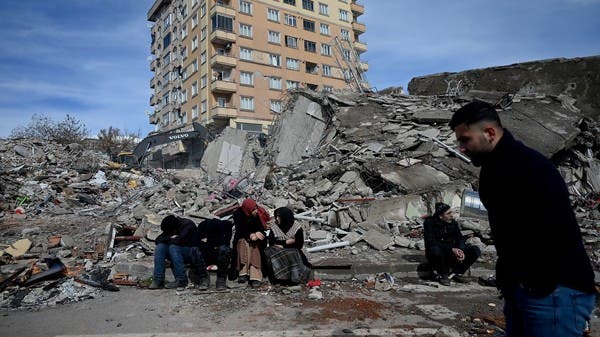From the Turkey earthquake (AP)
Turkey earthquake
The death toll raises questions about building standards
The rising death toll in Turkey after Monday’s twin earthquakes has raised questions about how poorly enforced building standards are in a country whose economy has long relied on the housing sector to drive growth.
Turkey introduced new building codes that require new construction to be earthquake-resistant, not least in the aftermath of the 1999 Izmit earthquake that killed more than 17,000 people, but these laws have often been loosely enforced in a country where more than half of all buildings are constructed illegally. According to the British newspaper “The Guardian”, which was reviewed by Al Arabiya.net.
While many experts pointed to the intensity of the two quakes, their relatively shallow depth and the type of quake – resulting from the so-called slip fault on the Eastern Anatolian Fault – for its destructive power, others saw evidence of poor construction, which caused some buildings to collapse catastrophically.
“The number one factor is the quality of the construction,” Ross Stein, president of disaster modeling firm Templar, told Scientific American in the immediate aftermath of the quake. “Building quality precedes all other causes of the disaster.”
In turn, geologist and disaster management expert at the Center for Disaster Management at Bournemouth University, Dr Henry Pang, said: “Some buildings simply collapsed to the ground while many others collapsed.” [متعددة] Decks are like a pack of cards. This indicates that most of the buildings did not have the relevant features to provide stability during an earthquake.”
Professor Ian Min, Professor of Seismology and Rock Physics at the University of Edinburgh, echoed this view, saying: “Looking at some pictures of the damaged buildings, it is clear that most of them were not designed to withstand very strong earthquakes. It is clear that many apartment complexes have experienced the so-called with the “pancake collapse”.
He continued: “This happens when the walls and floors are not joined together well enough, and each floor collapses vertically down onto the lower floor leaving a pile of concrete slabs with barely any gaps between them. This means that the chances of survival for anyone inside are very slim.” “.
He inferred his opinion from pictures of collapsed buildings, which are adjacent to other buildings that witnessed minor damage, which indicates the use of poor materials and evasive adherence to building standards in some buildings.
After an earthquake in 2011 killed hundreds, Turkey’s then prime minister, Recep Tayyip Erdogan, blamed poor construction for the high death toll, saying, “Municipalities, contractors and supervisors must now see that their negligence amounts to murder.”
The country’s architects and urban planners have long warned that building codes related to seismic activity are not being adequately enforced and have been undermined by a controversial amnesty for illegal construction – offered by Erdogan’s government – which has brought Turkey some $3 billion in revenue.
“This extraordinary destruction continues to repeat wrong urban policies and politically charged decisions such as the 2018 District amnesty law,” said the head of the Istanbul branch of the Federation of Chambers of Turkish Engineers and Architects, Professor Pelin Pinar Geritlioglu.
At the time of the amnesty, construction experts in Turkey warned that retroactive licensing of illegal buildings for a fee would have dire consequences.
“It will mean turning our cities, especially Istanbul, into cemeteries,” said the head of the Chamber of Civil Engineers in 2019, Cemal Gökçe.
“Whether it was completely unauthorized, or more floors were built than the original plan, they have given amnesty to all the buildings. This is very dangerous,” he added.
Samer Bagain, professor of planning and systems resilience at Kent’s School of Architecture and Planning, warns that even with effective building codes introduced as legislation, people will continue to do what they can get away with unless there is effective enforcement.
And even if you have architects and civil engineers [يقدمون توصياتهم الخاصة] The question remains whether they are being heard.

